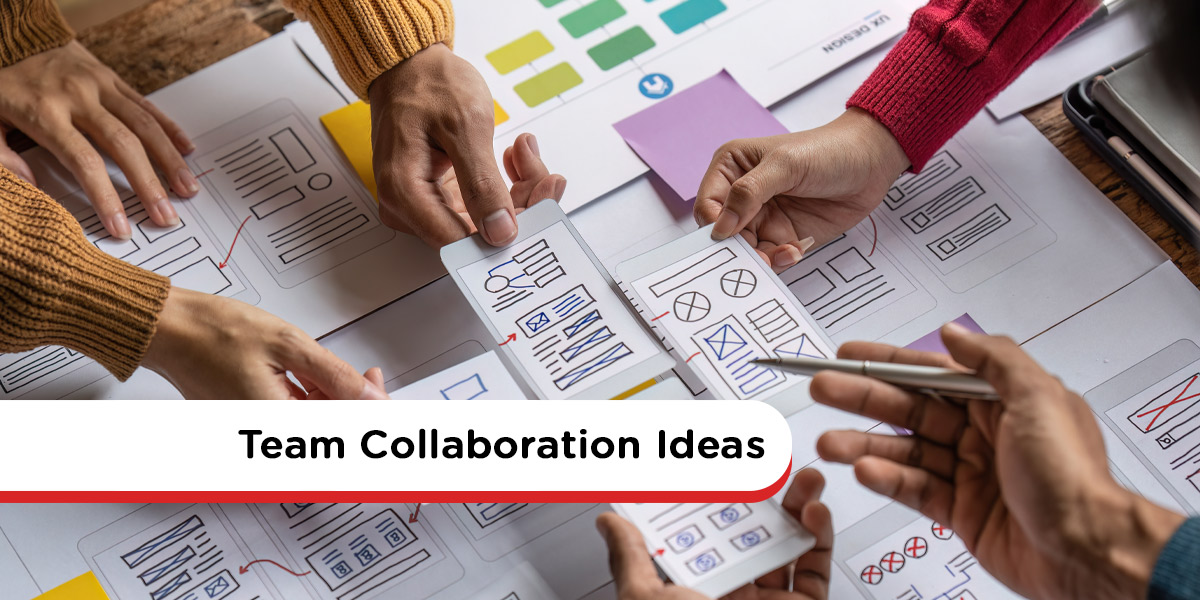
Your New Intranet Starts Here
Streamline communication, boost collaboration, and empower your team with MyHub's intuitive intranet solution.
Book a live demo now and experience the difference.
Take a Quick TourCollaboration is the rocket fuel that powers up all businesses, from Fortune 100 companies to small and medium-sized enterprises (SMEs). However, it’s often taken for granted in the workplace. Employers tend to assume that employees naturally know how to work together, communicate effectively, and deliver successful outcomes. The reality is quite different. Like any other soft skill, team collaboration skills must be developed and supported.
So, does your team have the essential workplace collaboration skills needed to succeed? This post will help you answer that question as we take a deep dive into the building blocks of a truly collaborative workplace.
But first, let’s define what we mean by effective collaboration at work.
What Is Effective Workplace Collaboration?
According to the Oxford English Dictionary, collaboration is “working with someone else to create or produce something.” In a business context, effective workplace collaboration means the outcome is stronger than what one individual could have achieved alone.
While the concept sounds simple, achieving it in practice comes with challenges. The first step toward building a collaborative workplace is to identify and remove these obstacles. Only then can you begin to assess and cultivate the necessary teamwork and collaboration skills.
Why Is Teamwork Important?
Teamwork and collaboration offer numerous benefits to both the organization and its employees. Here are some key advantages that make collaboration a must-have in today’s workplace.
Idea Sharing
Some of the most groundbreaking innovations start with simple idea sharing. When employees collaborate, they bring diverse perspectives, insights, and creativity to the table. This sparks innovation and drives business growth. Whether it’s a product enhancement or a process improvement, idea-sharing in the workplace fuels success.
Problem-Solving
Collaboration unites individuals with different skill sets and experiences. A diverse team can solve problems more efficiently, arrive at better solutions, and avoid tunnel vision. This leads to more agile, informed decision-making.
Knowledge Transfer
A collaborative culture encourages open communication and the seamless transfer of knowledge. Among all collaboration skills, this one helps organizations retain valuable internal expertise and reduces the risks associated with staff turnover or departmental silos.
Staff Development
Employees learn from each other when they collaborate. This peer learning fosters continuous development and cross-functional skill building. Plus, it boosts employee satisfaction, as workers feel more engaged and valued in a learning-rich environment.
Improved Efficiencies
Team collaboration leads to faster task completion and greater productivity. Tasks are divided based on individual strengths, improving efficiency and enabling teams to hit deadlines more consistently.
Watch this short video to see the power of teamwork in action: Team Collaboration Video
Workplace Collaboration Skills: Develop The Right Company Culture
Creating a collaborative workforce starts with building the right culture. Leaders, business owners, and HR professionals must lay a solid foundation by promoting shared values, setting boundaries, and modeling collaborative behaviors.
Here are the cultural building blocks required to strengthen workplace collaboration skills:
Clear Definitions
Every team collaboration should begin with clearly defined roles, responsibilities, and expectations. Whether it’s a small project or a large cross-departmental initiative, every team member should understand what they’re responsible for and how their work supports the overall goal.
Recognition And Respect For Others
Collaboration thrives in a culture of mutual respect. Every contributor should feel valued, regardless of their department, rank, or background. A collaborative workplace embraces diversity and inclusion as strengths, encouraging employees to bring their authentic selves to work.
Group Goals Supersede Personal Ones
For a collaboration to succeed, team goals must take priority over individual agendas and collaboration skills have to be beneficial for all. Leaders must set the expectation that the collective outcome matters more than personal recognition. This mindset fosters unity, accountability, and shared purpose.
It’s OK To Make Occasional Mistakes
Perfection is not the goal, progress is. A successful collaboration environment encourages open discussion of setbacks without fear of blame. Psychological safety and accountability go hand in hand, creating a space where teams can learn from mistakes and continuously improve.
Examples Of Collaboration Skills
Browse through any job posting, and you’ll likely see a requirement for “teamwork” or “collaboration.” Employers across industries are seeking professionals with strong collaborative skills that drive innovation and productivity.
According to a National Association for Colleges and Employers (NACE) survey, over 60% of employers look for evidence of teamwork skills when reviewing candidates’ résumés.
However, there’s a growing concern that graduates may be underprepared. One study found that only 37% of employers felt graduates possessed the teamwork abilities necessary to collaborate effectively in real-world settings.
So, what exactly are the essential collaboration competencies that today’s workforce needs? Let’s explore the most in-demand skills for high-performing teams.
Top 20 Examples Of Collaboration Skills
We’ve categorized these skills into two types: direct collaboration skills, which involve interpersonal interactions, and indirect (or soft) collaboration skills, which reflect behaviors, attitudes, and project management capabilities.
Use this list as a checklist to evaluate your own team or personal development goals.
Direct Collaboration Skills
- Active listening
- Patience during discussions and decision-making
- Open-mindedness toward diverse ideas
- Respect for differing opinions
- Conflict resolution and diplomacy
- Emotional intelligence in group settings
- Empathy and understanding of others’ perspectives
- Receptiveness to constructive criticism
- Negotiation skills and the ability to find common ground
- Curiosity to explore new ideas and ask thoughtful questions
Indirect Collaboration Skills
- Project management expertise
- Organizational skills for tracking tasks and deadlines
- Critical thinking for problem-solving
- Time management and prioritization
- Verbal communication for meetings and discussions
- Written communication for documentation and reporting
- Leadership abilities in team environments
- Decision-making skills to move initiatives forward
- Proficiency in digital tools such as Microsoft 365, Google Workspace, or Slack
- Understanding of productivity frameworks like Agile, Lean, or Waterfall
Let’s now explore how these collaborative abilities play out in practice, and how your organization can foster and strengthen them at every level.
Communication Skills
Effective communication is the foundation of workplace collaboration. Clear communication helps teams overcome challenges, resolve uncertainty around roles, and align on shared goals. Without it, even the most skilled teams may struggle to work together efficiently.
Strong internal communication enables employees to articulate ideas clearly and consistently update colleagues on progress. This includes managing multiple communication channels, such as video conferencing, messaging apps, email, phone calls, and face-to-face meetings, so everyone remains aligned.
Communication Skills = Collaboration Skills
However, great communication is more than just transmitting information. It also includes active listening, asking for clarification, paraphrasing to confirm understanding, and fostering respectful dialogue.
In hybrid or remote teams, text-based communication becomes even more critical. But don’t underestimate verbal and nonverbal skills. Whether on Zoom or in a meeting room, collaborators should speak concisely, debate respectfully, and use body language to build trust and rapport.
Examples Of Collaboration In The Workplace
What does effective collaboration in the workplace really look like? Let’s walk through a familiar example that showcases how strong collaboration skills transform a standard business process into a streamlined, team-driven success story.
Workplace Scenario: Developing A New Marketing Strategy
Most businesses revisit their marketing strategies regularly. Typically, this involves selecting a few key employees, scheduling a meeting, and revising the strategy over email. Documents are passed around, edits are made, and feedback is consolidated, sometimes messily, over multiple versions.
This traditional approach is prone to delays and communication breakdowns due to unclear roles or version control issues. Sound familiar?
Now imagine how this would work in a company that excels at all kind of collaboration skills using the right tools, like a cloud-based intranet. Here’s how it can look:
1. Set Up A Cross-Functional Project Team
Using the intranet’s staff directory, it’s easy to identify expertise across departments and build a diverse team. Roles and responsibilities are clearly defined and visible from the start, avoiding confusion later.
2. Create A Secure Shared Project Space
With a dedicated, private intranet space, team members, regardless of location, can collaborate asynchronously, share ideas, upload resources, and keep all discussions in one centralized hub.
3. Develop A Detailed Project Plan And Timeline
The project plan, with defined milestones and team responsibilities, is shared on the intranet. Everyone stays aligned by updating progress using an embedded MS Project or task management spreadsheet, ensuring collaboration skills going wild!
4. Gather Input With Intranet Surveys And Polls
To improve employee engagement and decision-making, run an intranet poll or survey to gather input from the wider workforce. This inclusive approach improves outcomes and increases buy-in from all levels of the organization.
5. Co-Create The Marketing Strategy Draft
Instead of emailing documents back and forth, embed MS Word or Google Docs directly into the project space. Team members can edit in real time, leave comments, and always access the most up-to-date version.
6. Finalize And Publish Through The Intranet
Once approved by leadership, publish the final strategy on the intranet to save on printing and distribution. Use the intranet’s news feed to notify staff and allow them to download or access the strategy anytime, anywhere.
Streamlined, collaborative, and cost-effective, this is the power of a well-connected digital workplace.
Benefits Of Workplace Collaboration Skills
In today’s connected environment, nearly every role requires some form of team collaboration. Whether it’s departments working together on joint initiatives or cross-functional groups solving complex problems, collaboration is critical to business success.
Strong collaborative teams deliver better results, faster. But developing these skills doesn’t happen by chance. It requires intentional action, from leadership, HR, and employees alike.
To build a culture of collaboration, employers must create supportive environments, hire for collaboration competencies, and implement the right technology, like a cloud-based intranet solution.
Improve Your Collaboration Skills
Improving collaboration begins with self-awareness and a willingness to grow. Use feedback from managers and team members to reflect on your performance. Embrace emotional intelligence and be open to change.
The tips and real-life example shared above should inspire you to take proactive steps. Even small changes can help you become a more effective team contributor.
Ready to transform the way your organization collaborates in 2025 and beyond? Explore how MyHub’s intranet software can help. Book a free demo or sign up for a 14-day no-obligation trial today.
FAQ Section
What are essential collaboration skills in the workplace?
Key skills include clear communication, active listening, trust-building, adaptability, and coordination—it’s about sharing ideas, aligning goals, and responding promptly.
How do intranet tools support collaboration skills?
They centralize communication (chat/forums), encourage transparency with shared calendars and tasks, and promote innovation via ideation tools—all of which reinforce core collaboration competencies.
Why is mobile access important for team collaboration?
It ensures remote or flexible teams stay connected in real time—keeping workflows, updates, and engagement consistent regardless of location.





